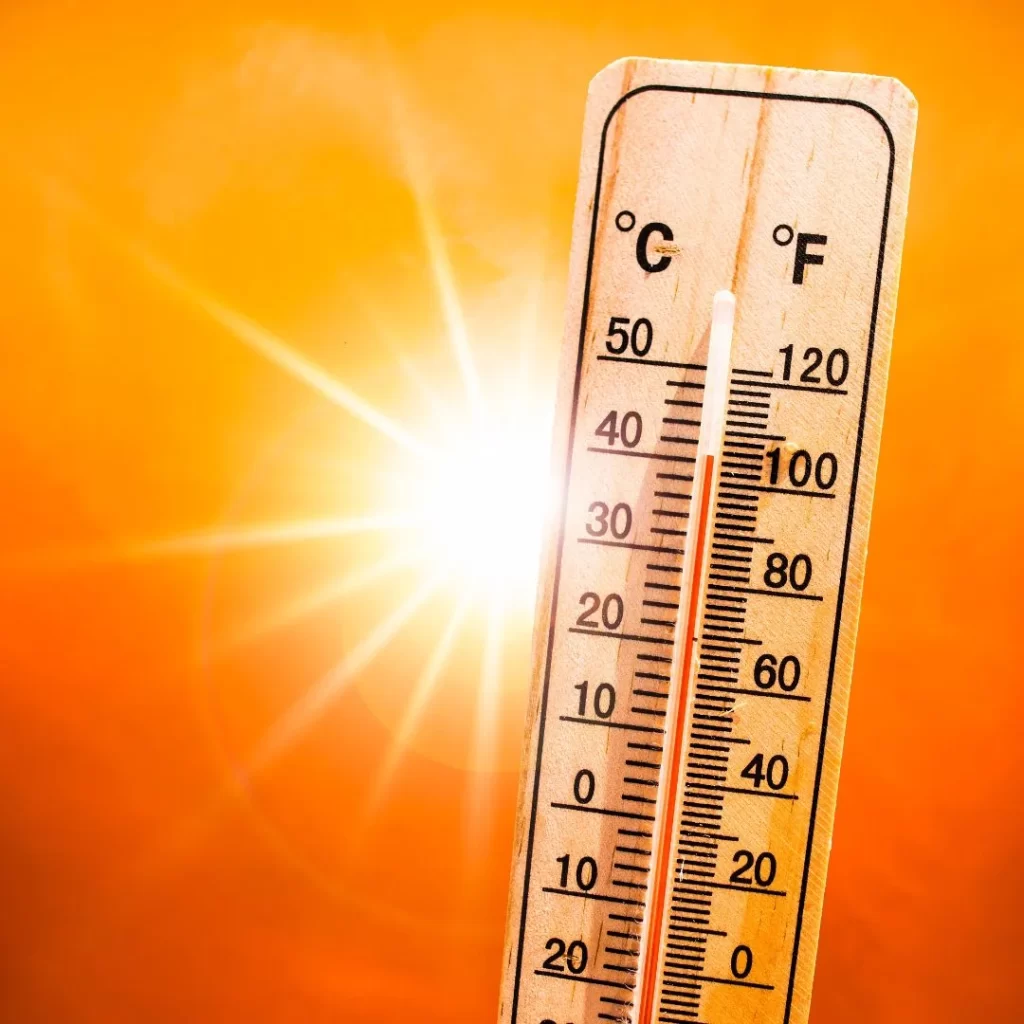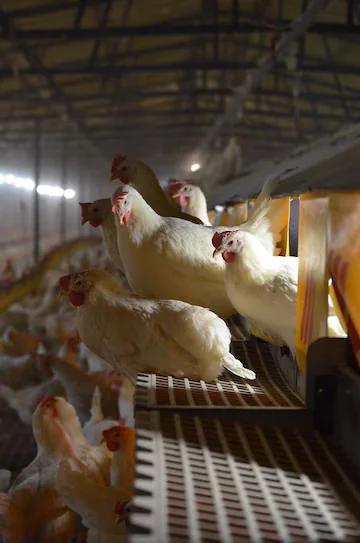Heat stress in poultry, a serious concern exacerbated by the increasing global temperatures, impacts the health, productivity, and welfare of broilers and laying hens across the globe. Recognizing signs of distress, such as altered feeding patterns and reduced egg production, is vital for poultry producers to mitigate adverse effects. The right balance of antioxidants in their diet, accessible drinking water, and methods to promote gut health play crucial roles in alleviating the burdens of heat stress on poultry.
This article delves into the critical role of Vitamin C, a potent antioxidant, in counteracting the negative impacts of heat stress in poultry. By exploring the mechanisms through which Vitamin C enhances resilience against heat, comparing its efficacy with other supplements, and offering practical tips for supplementing poultry diets, readers will gain insights into effective strategies for safeguarding poultry against the challenges of high ambient temperatures.

Heat stress in poultry is a complex physiological condition triggered when birds cannot adequately dissipate heat, leading to elevated body temperatures. This condition is influenced by various environmental factors such as high ambient temperatures, humidity, and the direct effects of solar radiation. In poultry, the thermoneutral zone, where birds maintain optimal body temperature without expending additional energy, typically ranges between 18°C and 22°C. Beyond this range, poultry must activate physiological and behavioural mechanisms to manage the excess heat.
Environmental Conditions: High temperatures and humidity levels hinder the birds' ability to lose heat through normal physiological processes like radiation, convection, and conduction.
Physical and Biological Traits: Factors such as age, body weight, feather coverage, and genetic predisposition affect a bird's heat tolerance.
Metabolic Heat Production: Higher metabolic rates in broilers, for instance, result in increased internal heat production, exacerbating heat stress conditions.
Physiological Impacts of Heat Stress
Behavioural Changes: Birds may exhibit signs like panting, reduced feed intake, and increased water consumption to mitigate heat.
Biochemical Shifts: There is an increase in respiratory rate and alterations in blood chemistry, which can lead to conditions like respiratory alkalosis.
Compromised Health and Performance: Chronic heat stress can lead to severe health issues including reduced growth, lower egg production, and increased mortality.
Understanding these dynamics is crucial for implementing effective management strategies to mitigate heat stress in poultry, ensuring their health, productivity, and welfare in challenging environmental conditions.
Vitamin C, known scientifically as ascorbic acid, plays a pivotal role in combating the detrimental effects of heat stress in poultry. This water-soluble vitamin acts as a powerful antioxidant, crucial for maintaining the health and productivity of poultry under high temperature conditions.
Rapid Depletion Under Stress: Unlike many animals, poultry cannot synthesize Vitamin C under stress conditions, leading to a rapid depletion of this crucial nutrient. This deficiency can cause oxidative damage to cells and tissues. Enhanced Heat Tolerance: Supplementing poultry diets with Vitamin C has shown to improve their ability to withstand heat by enhancing the efficiency of heat exchange and regulating metabolic changes. Immune Function and Disease Resistance: Vitamin C supplementation not only bolsters the immune system but also reduces mortality by mitigating stress-related metabolic symptoms.
Improved Growth Metrics: Studies have indicated that Vitamin C can significantly enhance growth performance. It aids in better feed conversion, increases average daily gain, and improves overall health metrics in heat-stressed poultry.
Reduction in Stress Markers: Adding Vitamin C to poultry diets helps in reducing malondialdehyde content—a marker of oxidative stress—and increases the activity of essential antioxidant enzymes.
Synergistic Effects with Other Nutrients
Enhancement of Vitamin E Activity: Vitamin C is instrumental in restoring the activity of Vitamin E, another vital antioxidant, thereby providing a compounded protective effect against oxidative stress.
Support in Mineral and Vitamin Absorption: It facilitates the absorption of other important nutrients like Vitamin D3, crucial for bone health and eggshell quality in laying hens.
By integrating Vitamin C into poultry diets, farmers can significantly alleviate the impacts of heat stress, enhancing the birds’ overall resilience against high ambient temperatures. This approach not only supports the health and welfare of the poultry but also contributes to sustainable production practices in the face of increasing global temperatures.

Vitamin C plays a multifaceted role in mitigating heat stress in poultry, primarily through its function as a potent natural antioxidant and its involvement in several critical biochemical pathways. Here's how Vitamin C acts at various levels to combat the effects of heat stress:
Reduction of Oxidative Stress: Vitamin C acts as a reducing agent and electron donor, which helps in neutralizing free radicals and reducing oxidative damage to cells and tissues.
Enzymatic Support: It activates enzymes like lysyl hydroxylase and prolyl hydroxylases, crucial for collagen synthesis. This supports the integrity of blood vessels and other connective tissues under stress conditions.
Metabolic and Physiological Regulation
Carnitine Synthesis: Vitamin C is essential in the carnitine pathway, which is vital for fatty acid metabolism and energy production, helping birds better cope with energy demands during heat stress.
Adrenal Cortex Stimulation: It aids in the proper functioning of the adrenal glands, increasing the production of corticosteroids, which play a role in stress response and inflammation reduction.
Immune System and Stress Hormone Management
Immune Enhancement: Vitamin C improves the function of macrophages and the overall immune response, which is often compromised under heat stress.
Stress Hormone Regulation: It helps in the synthesis of stress-related hormones like norepinephrine, which are crucial for managing the physiological impacts of stress.
By understanding these mechanisms, poultry producers can better utilize Vitamin C supplementation to enhance the resilience of their flocks against heat stress, thereby improving overall health and productivity.
Vitamin C, a non-essential nutrient in poultry, plays a significant role in combating heat stress by enhancing the birds' ability to withstand elevated temperatures. This is particularly important as environmental stressors can impede endogenous synthesis, necessitating exogenous supplementation. Research indicates that an average supplementation of 250 mg/kg of vitamin C can positively influence performance parameters and meat quality in broilers exposed to heat stress.
Vitamin C's effectiveness is often compared with other antioxidants like vitamin E. While vitamin C directly contributes to the reduction of oxidative stress by neutralizing free radicals, vitamin E primarily protects membrane lipids from oxidation. Studies suggest that vitamin E, when used above recommended levels, can improve meat quality by reducing lipid oxidation, which is beneficial for maintaining meat color and reducing spoilage.
The impact of vitamin C on meat quality shows mixed results. Some studies report no significant change in meat color or other sensory characteristics when dietary vitamin C is used. However, others have noted improvements in the yellowness of breast muscle and the tenderness of the meat, which are critical for consumer acceptance and processing quality.
The interaction between vitamin C and other vitamins, such as vitamin D3 and vitamin E, is also noteworthy. Vitamin C is essential for the effective absorption of vitamin D3,